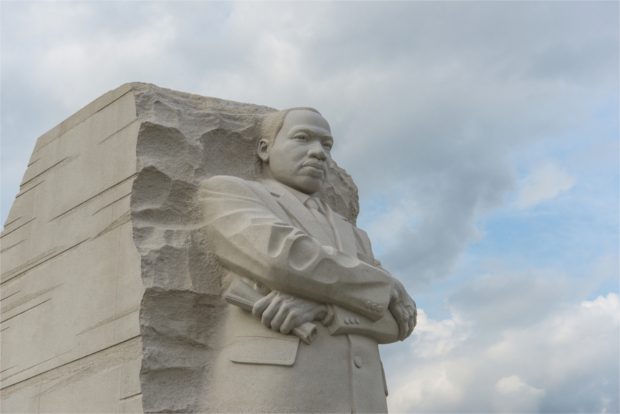Obama’s Missing Peace

My MLK-weekend column in The Week is on a theme that Daniel Larison touched on today as well: peace, and the lack thereof, either abroad or at home.
Larison lacerates President Obama for a legacy of “continuing U.S. involvement in wars in Iraq, Syria, Afghanistan, and Yemen, and . . . the ability to start, escalate, and join wars at will without Congressional authorization” (and he might have added the routinized deployment of flying robot assassins), and blames that legacy on a lack of opposition from either left or right. Myself, I focus on one reason for the failure of Obama’s promise in this regard: that we’ve forgotten what it means to hold up peace as an ideal in the first place.
One might well say, who doesn’t wish for peace? But for that wish to be other than idle, one must accept that peace is sometimes more important than other values. Peace cannot merely be the greatest reward of victory. It must be, at least in some circumstances, more important than victory. To say that a lasting peace can only be constructed on a foundation of fundamental agreement and a consonance of interests is to say that a lasting peace is impossible. And even if such a peace is indeed impossible now, merely to hold it up as an ideal requires saying that some differences will not be resolved, and yet even so we will still not fight.
This is a crucial point. It is true that the surest foundation of peace is justice. But justice is very much in the eye of the beholder — and so in a deeper sense, the surest foundation of justice is peace, that is to say, a mutual agreement to respect a process that all sides know is unlikely to give them total victory even if they believe that they are absolutely right.
I’ve written about this before in the context of the diplomatic agreement with Iran. If you assume that peace is what you get when interests are aligned and differences are resolved, then whenever you have materially differing interests between parties you’ll anticipate conflict, and eventually war. If you think that order can only arise from a monopoly of violence, you will want to be pretty sure that you hold that monopoly. So if you assume that we can never be at peace with Iran until it presents no challenge to American interests, then you should expect never to have peace. But if you think that conflicting interests are normal, and yet that the pursuit of peace is noble, you will seek ways to resolve those conflicts when possible, and to live with them unresolved when it is not. And you’ll wind up signing something like the nuclear deal.
Meanwhile, peace as an ideal has been orphaned at home as well as abroad — and it’s not all the fault of the outrageous and obstructionist right:
If peace has been in short supply internationally, the same, unfortunately, holds true in the domestic sphere. The ideal of progress is a noble one, of course. Moreover, President Obama should be applauded for pursuing that ideal in a reasoned, measured, and generally responsible manner, in the face of opposition that, too frequently, anathematized the very idea of compromise.
But a politics that charts by progress as its only star can never rest — and so can never know peace. If it does not go abroad in search of monsters to destroy, progress must seek them at home. A more perfect union sounds like a wonderful thing to devote one’s life to bringing about. But a world in which we must struggle ceaselessly to make the union more perfect by our own lights — lest our opponent perfect it by their lights first — is to condemn society to an ever-escalating ideological arms race.
This is also something I’ve written about before, in the context of another Obama speech, and again, I don’t intend to ascribe blame for our state of social agitation primarily to the progressive left. My point, rather, is that without peace as an ideal, our politics only has meaning when construed as a battle, whether that’s a battle for progress or for some other set of ideals. We have to be able to talk about peace as an ideal to make its pursuit seem like a laudable goal rather than a pathetic compromise.
This is perhaps a strange message for MLK Day, whose core ideal was justice and who was very willing to disrupt peace in its pursuit (which did not contradict at all his commitment to non-violence). But perhaps that’s precisely why I do want to stress it again today. The very extravagant hopes invested in the Obama Presidency are, in part, a testament to our failure to understand what peace is. On the right, peace is conflated with order; on the left, it is conflated with justice. But peace is a thing in its own right, and the only reason we don’t remember that is that we’ve experienced so little of it.
If we want to recover it, we had best remember.
Comments